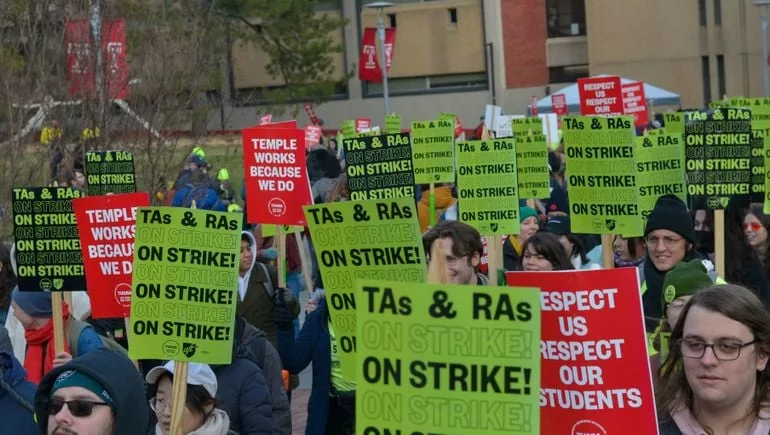[ad_1]
Dive Brief:
- Temple University, a public institution in Philadelphia, has pulled tuition remission benefits for its graduate student employees who are currently on strike. All striking graduate students must pay their tuition bill in full by March 9 or face a $100 late fee and a financial hold on their student accounts that will keep them from registering for future classes, according to an email from the university.
- Temple has also deactivated the health insurance plans of striking students, according to the Temple University Graduate Students’ Association, the union representing teaching assistants, research assistants and graduate assistants.
- TUGSA, which represents 750 graduate employees, went on indefinite strike Jan. 31 after over a year of stalled negotiations with the university over pay, healthcare and parental leave. This is the first time in the group’s 26-year history it has gone on strike.
Dive Insight:
The strike and ensuing fallout at Temple come as universities across the country are seeing increased unionization and strikes, especially among graduate employees.
In early 2022, graduate employees at both Massachusetts Institute of Technology and Fordham University, in New York, voted to unionize, and those at Indiana University went on strike for four weeks. And in December, the University of California system saw roughly 48,000 academic workers go on strike, the largest strike in U.S. higher education history.
While student worker strikes are no longer rare, the severity of Temple’s response is out of the ordinary.
Employers threatening to cut benefits during a strike is not uncommon — but following through with it is, according to Bethany Kosmicki, former president of TUGSA.
Temple began deactivating strikers’ health insurance plans without notifying them last week, she said.
“Our members discovered at the pharmacy and doctor’s office that they no longer had insurance,” Kosmicki said at a news conference Thursday. “We believe that the way Temple chose to cut off our benefits was in retaliation for participating in our right to strike and are pursuing a challenge to it.”
Temple stood by its decision to pull benefits from striking students.
“In accordance with Pennsylvania law, those TUGSA members who have chosen not to work and are on strike are no longer entitled to their compensation and work-related benefits, which include tuition remission,” a university spokesperson said in a statement. “Because striking workers are not entitled to tuition remission, they have been notified of their obligation to make arrangements to pay their tuition, consistent with how the university treats other students who have unpaid tuition obligations.”
Only striking union members, who make up less than 20% of the union, will be affected, the university said.
Temple also warned the campus population against participating in a campuswide walk-out the union has scheduled for Feb. 15.
“We want you to know that striking TUGSA members have no authority to cancel classes or make any promises regarding your attendance, grades or any other matter related to courses they are no longer teaching,” Gregory Mandel, Temple’s provost, said in an email to students.
The union has also encouraged undergraduate students to skip class and join the union’s daily picketing in solidarity. Mandel warned that missing classes or assignments could hurt students’ academic progress.
“We understand that some of these striking instructors are making this request while they continue attending classes, so as not to jeopardize their own academic progress,” Mandel said.
The American Association of University Professors backed the union, calling the university’s actions shameful and retaliatory.
“The vindictive act of cutting graduate student healthcare and tuition benefits rather than simply sitting down at the table to negotiate is a shameful tactic meant to break the will of the hard-working graduate students whose contributions make Temple University the premier university it is,” Irene Mulvey, AAUP president, said in a statement Thursday.
The union and the university don’t appear to be close to resolving the contested issues.
The union is seeking a base wage for graduate assistants of $32,800, up from the current average of $19,500. The university has offered 3% raises over a four-year contract, equaling a salary of roughly $22,500 in 2026, according to TUGSA.
The union also wants to increase parental leave from five paid days to 45. Temple is offering 10 days, according to The Philadelphia Inquirer.
[ad_2]
Source link
Meet Our Successful Graduates: Learn how our courses have propelled graduates into rewarding
careers. Explore their success stories here!
Discover More About Your Future: Interested in advancing your teaching career? Explore our
IPGCE, MA, and QTS courses today!

Explore Our Courses: Ready to take the next
step in your education journey? View our
comprehensive course offerings now!

